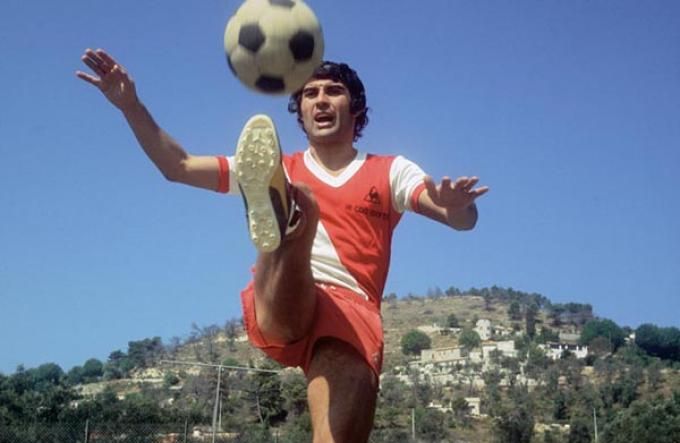Born in Giuliano di Roma (Italy) on March 24, 1948, Delio Onnis grows up in his South-American fatherland, Argentina, and makes his debut for Almagro aged 18.
Two years later, he joins La Plata’s Gimnasia and compiles 53 goals in 93 league games for the River Plate side, putting him on the radar of several European clubs. In the end, it is Stade de Reims who brings him across the Atlantic to France in 1971, the country where he will play his entire career and write one of the best pages in the history of its football. His early departure from Argentina and failure to play for one of the bigger Buenos Aires sides means that Onnis will never get to enjoy the status he eventually earns in France back home.
The young forward, then 20, already shows glimpses of things to come at Reims with 39 goals in two seasons, for a once-glorious side now firmly stuck in the middle of the French First Division league table. In 1973, he joins AS Monaco hardly aware of what would befall him in the seven years he would be with the club.
The very illustration of a fox-in-the-box, Onnis proves a predator always there to beat the offside trap, at the right place at the right time. Solo efforts from in and outside the box scored with any part of the body; tap-ins, flukes and penalties : Onnis has the spectrum of a complete striker in the making. And yet, far from your selfish target man, he always looks for special partnerships with team-mates : Jean Petit at AS Monaco, Albert Emon at Toulon. He refuses to wear shinpads and always keeps his socks down, like the other French football star of that era, PSG play-maker Safet Susic.
Quickly establishing himself as the fulcrum of the team, Onnis piles on the goals, scoring 26 in his first season at the club and finishing second in the top scorer rankings behind his countryman Carlos Bianchi. He compiles a staggering 30 goals in his second season, a tally only equalled or better by three players since : Bianchi, Jean-Pierre Papin and Zlatan Ibrahimovic.
Carrying the team on his shoulders, he would go on to become AS Monaco’s greatest ever striker with 223 goals in 280 games. The season after collecting the accolade for best scorer in the league, his club is relegated and numerous clubs knock on his door. Onnis refuses to hear them and makes his way to the Second Division where he again scores 30 goals, allowing the club to climb back to the top division a year after it went down. Hardly stopping there, he then bags 29 league goals in his come-back season in the French top-flight to lead AS Monaco to the championship title in 1978. At the age of 30 and the peak of his abilities, he hopes he will finally get the big call to the Argentina national team in the build-up to a World Cup his country will be hosting. But even this trophy and the personal accolades that go with it are not enough to catch the eye of Argentina manager César Luis Menotti. Onnis watches the World Cup go to his nation, on home soil, from the other side of the ocean.
A rift with Monaco president Jean-Louis Campora forces him to leave the club at his peak in 1980, having brought the club a French Cup and ending the league season again on top of the goal rankings. He joins freshly-promoted Tours FC in the summer of 1980 and is heavily involved in the club’s successful stay in the first league by finishing his first two seasons at the club on top of the goal rankings, with 24 goals in 1981 and 29 in 1982. Picking up his first major injury in 1983, he cannot prevent the club from going down and joins SC Toulon the next summer. There, he leads the side to two consecutive French Cup semi-finals in 1981 and 1982 (SC Toulon’s best ever results in that competition to date) and earns his last accolade of best scorer of the season in 1983-1984, at the age of 36, before calling a day to his career the following year, a couple of years before the Argentina side he always dreamed of representing wins another World Cup trophy.
Initially a South America scout for AS Monaco, Onnis tries his hand at coaching with SC Toulon and FC Paris before withdrawing from the football world altogether, maintaining his primary residence in Monaco. To this day, he remains the most prolific goalscorer in the French top-flight with 299 league goals (39 with Reims, 157 with Monaco, 64 with Tours and 39 with Toulon). The first foreigner after him in the all-time rankings is none other than his countryman Carlos Bianchi, ninth overall with 179 league goals.
Only two things deprived him from earning a legendary status: a lack of European silverware, as he plied his trade for clubs struggling to maintain their position in the French top-flight, let alone compete continentally; and an international career, Argentina never adopting this European (nicknamed “El Tano” or “The Italian” back home), while his native Italy never even related to this Argentinian. For these reasons, Onnis never received the worldwide audience his talent deserved, his gifts remaining a secret only French football fans from the 1970s and 1980s got to unveil.


